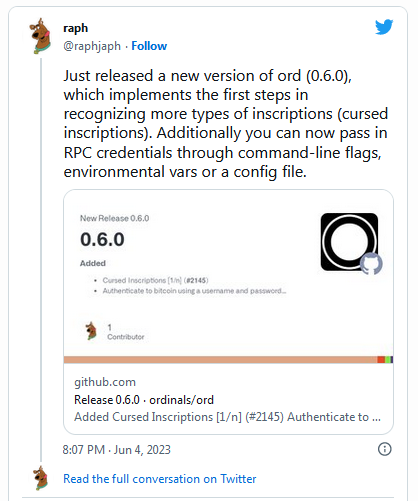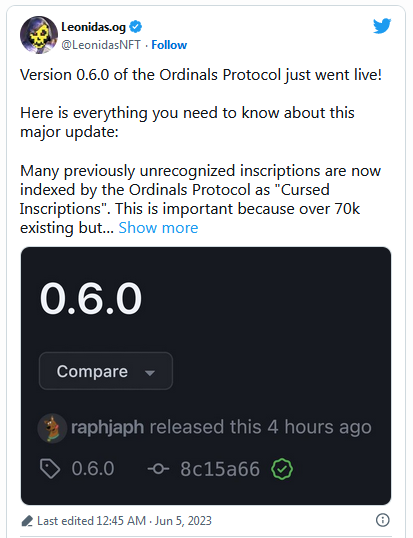A look at the major recent Bitcoin developments over the last few weeks.
Over the past month, Bitcoin has been consolidating within a tight range amid record-low volatility. The flagship cryptocurrency has also seen outflows over the last few weeks from digital asset funds. On the tech side, developers have rolled out a new upgrade to index invalid or “cursed” inscriptions, allowing them to be traded on the blockchain.
BTC Volatility Drops to Around 1%
Typically a highly volatile asset, Bitcoin has been consolidating within a tight range over the past two months. The leading cryptocurrency has traded between the $26,000 and $27,000 price levels over the past month.
The Bitcoin volatility index (BVI), which measures how much Bitcoin’s price fluctuates relative to its price, has dropped to 1.41% over the past 30 days, a level last seen in January this year. Over the past 60 days, the BVI has dropped to 1.63%.
The flagship cryptocurrency also posted its first monthly loss since December last month, dropping by around 7% in May to mark its first negative month of the year. Bitcoin is trading at $26,748, down by 1.8% over the past day.
Digital Asset Funds Mark 7th Consecutive Week of Outflow
Digital asset investment funds have recorded the seventh consecutive week of outflows, with another $62 million exiting over the seven days ending on June 4. Tron was the primary focus, seeing outflows totaling $51 million last week, according to the latest digital asset weekly fund flows report by CoinShares (ST:CS).
The report mentioned that over $329 million, representing 1% of total assets under management, have been withdrawn since mid-April. “From a proportional perspective this now matches the run of outflows seen at the beginning of 2022,” it said.
Low trading activity is likely the reason for recent outflows, with volumes remaining 60% below the yearly average. This is similar to the larger crypto market that has seen a 55% volume decline over the past seven weeks.
Smart contract platform Tron accounted for most withdrawals last week, with outflows of $51 million. “We believe this was a single investment product provider removing seed capital rather than anything more ominous,” CoinShares said.
Bitcoin experienced slight outflows of $2.7 million, whereas short-bitcoin had outflows of $6.3 million. Although short-bitcoin outflows are lower in absolute terms, they make up 44% of total AuM over the last six weeks, compared to only 0.9% for long-bitcoin. This suggests that investors have been cashing in and closing short positions instead of indicating a fundamental decrease in sentiment toward the asset.
Bitcoin Ordinals Developers Launch New Upgrade
On Saturday, developers behind Bitcoin Ordinals announced the launch of the newest version of the protocol, which “implements the first steps in recognizing more types of inscriptions (cursed inscriptions),” Twitter user Raphjaph, who describes himself as a “code sculptor and ordinal theorist,” said.
The term “cursed inscriptions” refers to inscriptions invalidated by erroneous or intentional misuse of the opcode during their creation. As a result, these inscriptions cannot be traded.
Casey Rodarmor, the creator of Ordinals, proposed addressing this problem in late April by identifying and converting these “cursed” inscriptions into “blessed” ones. “New inscriptions that would have been cursed before X are now not cursed, or “blessed,” and receive a positive inscription number instead of a negative one,” he said.
The upgrade was designed to support a certain type of cursed inscriptions. This was achieved by establishing a specific block activation height that converts previously invalidated inscriptions into normal positive ones that can be traded without issues.
The upgrade is important as over 70,000 “cursed” inscriptions cannot be traded, Ordinals influencer LeonidasNFT said. He added that everyone holding cursed inscriptions “should expect the negative inscription numbers to be shifted.”
“For this reason it doesn’t really make sense to focus too much on the specific negative inscription numbers that you hold as they will very likely change, potentially many times.”
Neither the author, Ruholamin Haqshanas, nor this website, The Tokenist, provide financial advice. Please consult our website policy prior to making financial decisions.
***
This article was originally published on The Tokenist. Check out The Tokenist’s free newsletter, Five Minute Finance, for weekly analysis of the biggest trends in finance and technology.


